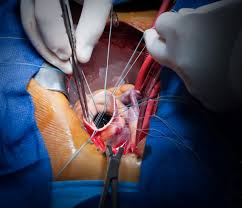
Heart Valves Surgeries
Heart Valve Operation
Heart valves can fail by narrowing (stenotic) and blocking blood flow, or by becoming leaky (regurgitant) and allowing blood to flow backward in the heart. A valve can be both stenotic and regurgitant. A multitude of disorders can result in defective heart valves.
Diseased heart valves can be addressed in several ways. These include:
1) Medication;
2) Surgical valve repair by heart valve operation;
3) Surgical valve change surgery;
4) Transcatheter valve replacement.
While medication cannot cure valve malfunction, it can often help to relieve symptoms. Your cardiologist, surgeon, or interventional cardiologist will discuss the alternatives with you if repair or replacement is required. The decision to replace or repair a valve is based on a variety of considerations, including the kind of valve, the severity of the ailment, and whether the problem is stenosis or regurgitation.
Our spectrum :
Mitral Valve Change Surgery or Repair
Aortic Valve Replacement Surgery or Repair
Tricuspid Valve Change Surgery or Repair
Double Valve Replacement Surgery or Repair
Bentall Surgery
Atrial Fibrillation Surgery
LA reduction surgery
CABG with Valve Change Surgery or repair
Minimally Invasive Valve Replacement Surgery
Signs and symptoms of a heart that needs help
Breathing problems
Dizziness
Chest discomfort
Fatigue
Retention of fluid
Who is a candidate for heart heart valve operation?
A damaged valve is repaired or replaced during heart valve surgery. A damaged heart valve prevents blood from flowing through the valves, impairing the heart's normal function.
The aortic valve, mitral valve, tricuspid valve, and pulmonary valve are the four types of valves in the heart. To restore normal function, any of these four valves may need to be surgically removed.
When is heart valve operation required?
To help blood flow in and out of the heart, valves open and close quickly. Valves are tiny leaflets that regulate blood flow within the heart's chambers. When these valves are injured or clogged, blood flow through and out of the heart is restricted, causing the heart to operate abnormally. The heart valve surgery is conducted in order to restore normal cardiac functions.
What are the signs and symptoms?
1. Breathing problems
2. Dizziness
3. Chest discomfort
4. Fatigue
5. Retention of fluid
Main Causes of Heart Valve Damage
A congenital abnormality is one that is present in the valve/s from birth, such as an aberrant valve size, abnormal formation, or failure to correctly attach to the supporting valve tissue.
Congenital heart valve defects:
1. Valve narrowing (stenosis)
2. Leakage in the valve/s causes regurgitation.
3. Stenosis of the pulmonary valve is a narrowing of the pulmonary valve.
4. The blood flow to and through the heart is impeded by atresia, which is caused by the absence of a valve or the faulty construction of the valve.
Acquired defects: Damage that occurs during a person's lifetime as a result of one or more of the following:
1. Degenerative alterations when people get older.
2. Rheumatic fever: harm produced by a rheumatic fever episode.
3. Other conditions that might be caused by valve diseases are :
1. Angina pectoris
2. Coronary artery disease (CAD) is a condition that affects the arteries
3. Myocardial muscle diseases. Aortic occlusion
4. Hypertension
5. Diseases of the connective tissue Tumors
Chandan Hospital is always available at your service. Visit us for complete cardiac care.
